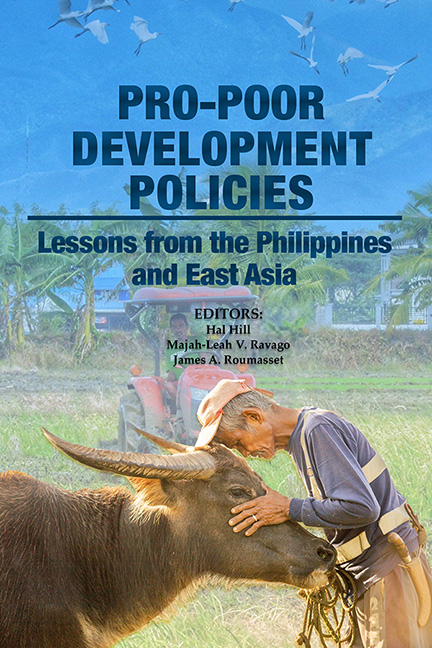Book contents
- Frontmatter
- Dedication
- Contents
- Figures, Tables and Boxes
- Foreword
- Foreword
- Message
- Preface and Acknowledgements
- About the Editors
- About the Contributors
- Acronyms
- Part 1 Introduction and Synthesis
- Part 2 Agricultural and Economic Development
- Part 3 Economic Policies for Achieving Targeted Levels of Living in the Philippines
- Part 4 Inequality and Economic Development
- Part 5 Competition Law and Policy
- Part 6 International Dimensions
- Index
23 - The Role of Government Subsidies in Philippine Agricultural Competition
Published online by Cambridge University Press: 09 January 2024
- Frontmatter
- Dedication
- Contents
- Figures, Tables and Boxes
- Foreword
- Foreword
- Message
- Preface and Acknowledgements
- About the Editors
- About the Contributors
- Acronyms
- Part 1 Introduction and Synthesis
- Part 2 Agricultural and Economic Development
- Part 3 Economic Policies for Achieving Targeted Levels of Living in the Philippines
- Part 4 Inequality and Economic Development
- Part 5 Competition Law and Policy
- Part 6 International Dimensions
- Index
Summary
INTRODUCTION
Government subsidies have been used to pursue legitimate public interests when markets do not deliver optimal outcomes for society. They are used to promote priority sectors and establish growth areas that are aligned with the government’s development goals (Administrative Order No. 59, Rationalizing the Government Corporate Sector, issued on 16 February 1988 by President Corazon C. Aquino). In the Philippines, the reasons commonly cited for subsidizing the agriculture sector include the need for market stability and food security, as well as to help low-income farmers and aid rural development.
The Philippine agriculture sector has received substantial subsidies over time. Figure 23.1 shows the subsidies to the sector from 2010 to 2015, which averaged PHP3.36 billion annually. The subsectors receiving sizeable subsidies in 2014 were papaya growing, perennial trees (with edible nuts) growing, operation of irrigation systems through non‑cooperatives and seaweed farming; it was dairy farming in both 2013 and 2014. The subsectors of operation of irrigation systems through cooperatives and services to establish crops, promote their growth and protect them from pests and diseases, n.e.c. received subsidies for most years between 2010 and 2015. Such support for the agriculture sector is provided through government-owned and controlled corporations (GOCCs).
The government enacted the Philippine Competition Act (Republic Act 10667) in 2015. Despite the passage of this law, however, the competition environment in the country remains weak because there are other existing laws deemed inconsistent with this Act. For instance, GOCCs have charters providing for both proprietary and regulatory functions. Some of these corporations receive subsidies that affect competition in two ways (Neven and Veroudin 2008). One, they influence the behaviour of competitors as a response to that of the recipient. Two, firms behave relative to how the government reallocates rent via subsidies. These nonneutral policies distort the market. Limited competition slows down economic development and job creation in key sectors (Miralles Murciego et al. 2018). There has been no empirical study that estimates the effects of government subsidies on firms’ behaviour and the business environment. This study bridges this gap by examining the market structure and power of agriculture subsectors that receive government subsidies.
- Type
- Chapter
- Information
- Pro-poor Development PoliciesLessons from the Philippines and East Asia, pp. 665 - 694Publisher: ISEAS–Yusof Ishak InstitutePrint publication year: 2022



